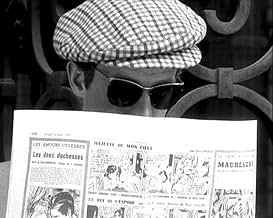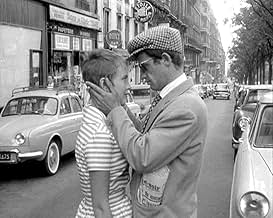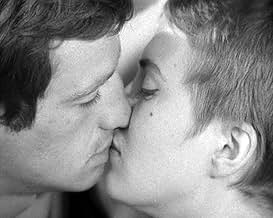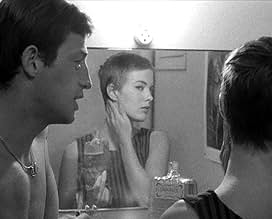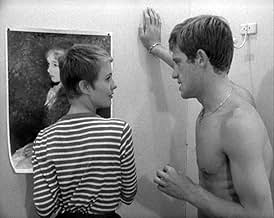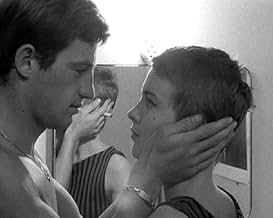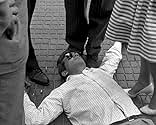एक चोर एक कार चुराता है और एक मोटरसाइकिल पुलिसकर्मी की हत्या करता है. अधिकारियों द्वारा वांछित, वह एक हिप अमेरिकी पत्रकारिता छात्र के साथ फिर से जुड़ता है और उसे अपने साथ इटली भागने के लिए म... सभी पढ़ेंएक चोर एक कार चुराता है और एक मोटरसाइकिल पुलिसकर्मी की हत्या करता है. अधिकारियों द्वारा वांछित, वह एक हिप अमेरिकी पत्रकारिता छात्र के साथ फिर से जुड़ता है और उसे अपने साथ इटली भागने के लिए मनाने का प्रयास करता है.एक चोर एक कार चुराता है और एक मोटरसाइकिल पुलिसकर्मी की हत्या करता है. अधिकारियों द्वारा वांछित, वह एक हिप अमेरिकी पत्रकारिता छात्र के साथ फिर से जुड़ता है और उसे अपने साथ इटली भागने के लिए मनाने का प्रयास करता है.
- निर्देशक
- लेखक
- स्टार
- 1 BAFTA अवार्ड के लिए नामांकित
- 5 जीत और कुल 4 नामांकन
Jean-Paul Belmondo
- Michel Poiccard a.k.a. Laszlo Kovacs
- (बिना क्रेडिट के)
Jean Seberg
- Patricia Franchini
- (बिना क्रेडिट के)
Richard Balducci
- Tolmatchoff
- (बिना क्रेडिट के)
Daniel Boulanger
- Police Inspector Vital
- (बिना क्रेडिट के)
Gérard Brach
- Photographer
- (बिना क्रेडिट के)
Philippe de Broca
- A Journalist
- (बिना क्रेडिट के)
José Bénazéraf
- Man in a White Car
- (बिना क्रेडिट के)
Jean Domarchi
- A Drunk
- (बिना क्रेडिट के)
Jean Douchet
- A Journalist
- (बिना क्रेडिट के)
Liliane Dreyfus
- Liliane
- (बिना क्रेडिट के)
- …
Michel Fabre
- Police Inspector #2
- (बिना क्रेडिट के)
Jean-Luc Godard
- The Snitch
- (बिना क्रेडिट के)
Roger Hanin
- Carl Zubart
- (बिना क्रेडिट के)
Henri-Jacques Huet
- Antonio Berrutti
- (बिना क्रेडिट के)
Raymond Huntley
- A Journalist
- (बिना क्रेडिट के)
André S. Labarthe
- Journalist at Orly
- (बिना क्रेडिट के)
फ़ीचर्ड समीक्षाएं
Jean-Luc Godard's, A Bout de Souffle is possibly the brightest star to shine from the French New Wave. The 'Nouvelle Vague' came about from a group of like minded film critics writing for the Cahiers du Cinema.
With his knowledge of classic film narrative and style Godard went out to create his own film in homage to, and also complete contradiction to, classic Hollywood film.
The plot reads almost like a crime thriller typical of the 1930-40's. A criminal on the run from the police; the distraction of a beautiful woman; the escape and eventually someones death. But it is in Godard's approach to film style and use of new technologies that the typical crime thriller was turned on its head.
In a break from classic Hollywood narrative the film opens with little equilibrium. Our protagonist's motives are unclear as he tears off to Paris leaving a woman and a dead cop in his trail. This in turn makes the ending somewhat open ended. With no sense of equilibrium to start with how can there be closure on what has happened throughout the film.
Another twist on the classic storytelling in film is the progression of plot. It is naturally assumed in classic Hollywood film, that everything the spectator sees they see for a reason. With Michel's constantly pointless phone calls to retrieve owed money the plot is not pushed along at all. The inclusion of a 25 minute digression from the plot stands to emphasise the spectators reliance on narrative structure in the watching of films. Although watching the film closely is, as always, important in following the story A Bout de Souffle requires that little bit extra to define where the plot is being progressed and where Michel or Patricia are just flattering their egos or each other.
All in all I personally think that A Bout de Souffle brought about a sense of realism not seen in Hollywood cinema before 1959 and even now. The fact that life isn't full of clues that will help us progress in say our relationships or escape from authority, but is infact full of digression; self exploration; and the confusions of love, ego and aspirations.
With his knowledge of classic film narrative and style Godard went out to create his own film in homage to, and also complete contradiction to, classic Hollywood film.
The plot reads almost like a crime thriller typical of the 1930-40's. A criminal on the run from the police; the distraction of a beautiful woman; the escape and eventually someones death. But it is in Godard's approach to film style and use of new technologies that the typical crime thriller was turned on its head.
In a break from classic Hollywood narrative the film opens with little equilibrium. Our protagonist's motives are unclear as he tears off to Paris leaving a woman and a dead cop in his trail. This in turn makes the ending somewhat open ended. With no sense of equilibrium to start with how can there be closure on what has happened throughout the film.
Another twist on the classic storytelling in film is the progression of plot. It is naturally assumed in classic Hollywood film, that everything the spectator sees they see for a reason. With Michel's constantly pointless phone calls to retrieve owed money the plot is not pushed along at all. The inclusion of a 25 minute digression from the plot stands to emphasise the spectators reliance on narrative structure in the watching of films. Although watching the film closely is, as always, important in following the story A Bout de Souffle requires that little bit extra to define where the plot is being progressed and where Michel or Patricia are just flattering their egos or each other.
All in all I personally think that A Bout de Souffle brought about a sense of realism not seen in Hollywood cinema before 1959 and even now. The fact that life isn't full of clues that will help us progress in say our relationships or escape from authority, but is infact full of digression; self exploration; and the confusions of love, ego and aspirations.
The film that both kicked off the French New Wave era and best represents it, "Breathless", is very entertaining. Perhaps there is some deep commentary on the human condition that I am completely missing, but as far as I can tell, this is an example of a film that is more concerned with style over substance.
The most important thing this film is remembered for is it's general disregard for the so called "rules" of filmmaking. It boasts groundbreaking cinematography, introducing the "Jump Cut" to make the film's pacing more kinetic. The other most notable aspect of this film is its dialogue: natural, yet almost poetic in its delivery.
The two leads are very charming, especially Belmondo's Michel. His suave demeanor and charismatic presence steals whatever scene he's in. Jean Seberg's turn as Patricia is more subtle and nuanced, making her role the more complex of the two, even if it's not as entertaining as Belmondo's performance.
As I have stated earlier, this is not a film that is concerned with plot as much as it is feel. Director Jean-Luc Goddard was trying to do something new for the cinema world, and succeeded in doing so. "Breathless" is a must see for any cinephile due to its long term impact on film as a medium.
8.5/10.
The most important thing this film is remembered for is it's general disregard for the so called "rules" of filmmaking. It boasts groundbreaking cinematography, introducing the "Jump Cut" to make the film's pacing more kinetic. The other most notable aspect of this film is its dialogue: natural, yet almost poetic in its delivery.
The two leads are very charming, especially Belmondo's Michel. His suave demeanor and charismatic presence steals whatever scene he's in. Jean Seberg's turn as Patricia is more subtle and nuanced, making her role the more complex of the two, even if it's not as entertaining as Belmondo's performance.
As I have stated earlier, this is not a film that is concerned with plot as much as it is feel. Director Jean-Luc Goddard was trying to do something new for the cinema world, and succeeded in doing so. "Breathless" is a must see for any cinephile due to its long term impact on film as a medium.
8.5/10.
Jean-Luc Godard intended to shake the delicate world of cinema, that much is obvious. But did he intend to reinvent it? Whether it was his intention or not isn't the point, the point is this; he did. Jean-Luc Godard, and Francois Truffuat are the undisputed fathers of the French New Wave. Some cinephiles or historians may feel like pointing elsewhere, to Jean Renoir for example, protesting that he is truly the father of the French New Wave, I disagree entirely. The French New Wave was a product of the kindred spirits and talents of Godard and Truffaut. And no other film represents the French New Wave more coherently than Jean-Luc Godard's dazzling 1960 picture, 'Breathless'. Unorthodox and uninhibited. Raw and experimental. Godard broke every rule in the book, disavowed the laws of cinema, and scribed a new rule book, one where the pages are blank, and possibilities are endless. The story is so simple I can summarize the entire film in half of a sentence, but I refuse to give you or Godard the satisfaction. What counts in Breathless is not the story, but how the story is told. The very definition of 'cool', the film is robust in creativity, and exuberant in its flaws, and passionate about its reckless behavior. Self aware and rebellious. If there was no breathless, there would have been no Tarantino, if there was no French New Wave, the streak of genius that ran through the nineties and 2000s wouldn't have existed. Before Breathless, it was believed that films took money, that you had to find yourself in a place of authority to make a film. Breathless broke this misconception. Breathless makes you want to run outside and make the film of your life. Breathless made that possible, Breathless made the amateur the auteur, Breathless reinvented the face of the cinema, and made you believe that could too. All you need is a girl and gun.
There's a rogue with several pseudonyms in tow, a small time crook who several girls think is a beau, not the most, trustworthy guy, he'll spin a yarn or two and lie, so be careful where you keep your hard earned dough. He's been known to shoot and kill with firearm, after being chased by the local gendarme, so he's off to Italy, when he's collected fiscally, will take Patricia, who's been caged by Gallic charm.
Still a wonderful introduction to the world of French cinema of the time, but needs to be taken in context as familiarity breeds contempt and this was, after all, part of the foundations and a cornerstone of so much of what was to come. Imaginatively and innovatively directed by one of the greatest, with two flowers of the 60s revealing their early petals, and after smoking so many cigarettes, is it any wonder you'd struggle to catch your breath!
Still a wonderful introduction to the world of French cinema of the time, but needs to be taken in context as familiarity breeds contempt and this was, after all, part of the foundations and a cornerstone of so much of what was to come. Imaginatively and innovatively directed by one of the greatest, with two flowers of the 60s revealing their early petals, and after smoking so many cigarettes, is it any wonder you'd struggle to catch your breath!
So says the novelist in response to Patricia's question, "What do you hope to attain out of life?" That response is the philosophy of the film and of every character in the film. All want to be in control of their destiny. All want to be something that they are not. None are able to do any of these things. They are all contradictions. How can you die as an immortal? How can Patricia be free and independent is so many other things determine what she can do? How can this film transcend the screen while existing on the screen? This is an amazing film to watch. Goddard fills every scene with ingenuity and energy. He puts his actors in a beautiful environment and lets them do their thing. And they do it extremely well. The actors are beautiful. Not just cosmetically, but spiritually and psychologically. I am not sure that I liked either of the two main characters. I am sure I could not keep my eyes off them. I could not take my eyes off the screen. Techniques that novices today use for no substantial purpose are utilized by Goddard to amazing effect. The greatest filmmakers are the great editors. Goddard makes the editing a character itself. It is the nervous narrator hurrying the film along. It breathlessly awaits the next scene, and leads us to do the same. I like the way Goddard spends prodigious time simply watching his characters. The conversation scene at the center of the film is amazingly long and drawn out, yet I did not find it boring. I found it fascinating. People are fascinating. Everyone is trying to be something. It takes tremendous talent to indulge in the minutiae of existence. A great film.
क्या आपको पता है
- ट्रिवियाDespite reports to the contrary, Jean-Luc Godard did not shoot the film without a script; however, he did not have a finished script at the beginning, instead writing scenes in the morning and filming them that day. See also Pierrot le fou (1965).
- गूफ़During street shots, countless passersby look at Patricia and Michel and stare into the camera, revealing that the shots were made without filming barriers and simply used street pedestrians in place of extras.
- भाव
Patricia Franchini: What is your greatest ambition in life?
Parvulesco: To become immortal... and then die.
- कनेक्शनEdited into Pariz pripada nama! (2016)
टॉप पसंद
रेटिंग देने के लिए साइन-इन करें और वैयक्तिकृत सुझावों के लिए वॉचलिस्ट करें
- How long is Breathless?Alexa द्वारा संचालित
- What is the significance of Michel rubbing his lips with his thumb?
- What does Michel say at the end of the movie?
- What is the movie playing in the theater when Michel and Patricia are trying to escape from the detectives?
विवरण
- रिलीज़ की तारीख़
- कंट्री ऑफ़ ओरिजिन
- भाषाएं
- इस रूप में भी जाना जाता है
- Sin aliento
- फ़िल्माने की जगहें
- 11 rue Campagne Première, Paris 14, पेरिस, फ़्रांस(on location)
- उत्पादन कंपनियां
- IMDbPro पर और कंपनी क्रेडिट देखें
बॉक्स ऑफ़िस
- बजट
- FRF 4,00,000(अनुमानित)
- US और कनाडा में सकल
- $4,14,173
- US और कनाडा में पहले सप्ताह में कुल कमाई
- $32,424
- 30 मई 2010
- दुनिया भर में सकल
- $5,94,865
- चलने की अवधि1 घंटा 30 मिनट
- रंग
- ध्वनि मिश्रण
- पक्ष अनुपात
- 1.37 : 1
इस पेज में योगदान दें
किसी बदलाव का सुझाव दें या अनुपलब्ध कॉन्टेंट जोड़ें






